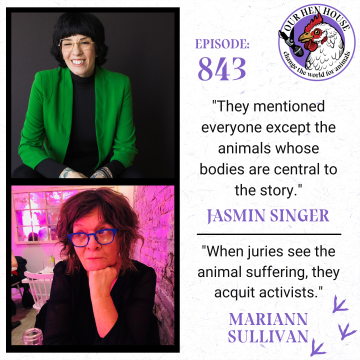
 Our Hen House: Vegan & Animal Rights Movement | Stories from the Frontlines of Animal Liberation
Our Hen House: Vegan & Animal Rights Movement | Stories from the Frontlines of Animal Liberation The Hen Report: “It’s the Cow, Not the How” | Media Critique & Food System Myths
In this eye-opening episode of The Hen Report, hosts Jasmin Singer and Mariann Sullivan welcome back Jan Dutkiewicz, professor of political science at Pratt Institute and co-author of the forthcoming book Feed the People: Why Industrial Food is Good and How to Make it Even Better. The conversation centers on a problematic New York Times article about animal rights activism in Sonoma County, which Jan critiques as “journalistic malpractice” for its misrepresentation of Direct Action Everywhere (DXE) and its failure to mention key investigations into factory farming operations hiding behind a “humane” facade. Jan explains how the article reinforces harmful myths about small-scale farming while dismissing legitimate animal welfare concerns, and discusses how these issues connect to his upcoming book’s examination of food systems, environmental impacts, and the impossibility of scaling “humane” animal agriculture to meet current consumption demands.
Episode Highlights:
- Media Criticism: Jan provides a detailed critique of a recent New York Times article that misrepresents animal rights activism in Sonoma County and fails to mention crucial investigations by DXE that exposed factory farming operations.
- The Reichert Duck Farm Case: Discussion of how the article completely omits mention of the Reichert Duck Farm investigation, which exposed inhumane factory farming conditions hidden behind a “humane” marketing facade.
- Sonoma County’s Self-Image: Analysis of how the article uncritically accepts Sonoma County’s self-portrayal as a haven for humane farming despite voters rejecting a ballot initiative to ban factory farming.
- Legal Injustice: Examination of how courts in Sonoma County refused to allow animal rights activists to present the necessity defense or show evidence of animal suffering, unlike in Utah where similar evidence led to acquittals.
- Food System Myths: Jan discusses his forthcoming book “Feed the People,” explaining how small-scale “regenerative” farming is neither environmentally superior on a per-animal basis nor scalable to meet current consumption demands.
- Environmental Impact: Explanation of the “cow not the how” principle – that the environmental impact of animal agriculture depends more on what animals are raised rather than how they’re raised.
- Book Preview: Jan shares insights from his upcoming book (available February 17th) about industrial food systems, environmental impacts, and the need for more plant-based food production at scale.
- Media Responsibility: Discussion of how journalists should approach stories about animal rights activism with proper context, explaining both normative positions and factual investigations rather than reinforcing stereotypes.
RESOURCES
_____________________________________________
Thank you for listening to the Our Hen House podcast! If you enjoy our podcasts, believe in our mission to effectively mainstream the movement to end the exploitation of animals, find community and solace in our shows and resources, and would like to show your support for vegan indie media, please make a donation today. Contributions of any amount will go towards our fundraising goal and are hugely appreciated. Our Hen House is a 501(c)(3) nonprofit organization, so it’s tax-deductible. Thank you for helping us create quality content!
Subscribe to our show on Apple Podcasts, YouTube, or your favorite podcatcher, and don’t forget to leave a 5-star review!
Check out Our Hen House’s other podcasts: The Animal Law Podcast, The Teaching Jasmin How to Cook Vegan Podcast, and the Antiracism in Animal Advocacy Audio Series.
Follow us on social media! You can find Our Hen House on Facebook, Instagram, TikTok, or Bluesky.
The Our Hen House theme song is written and performed by Michael Harren.


